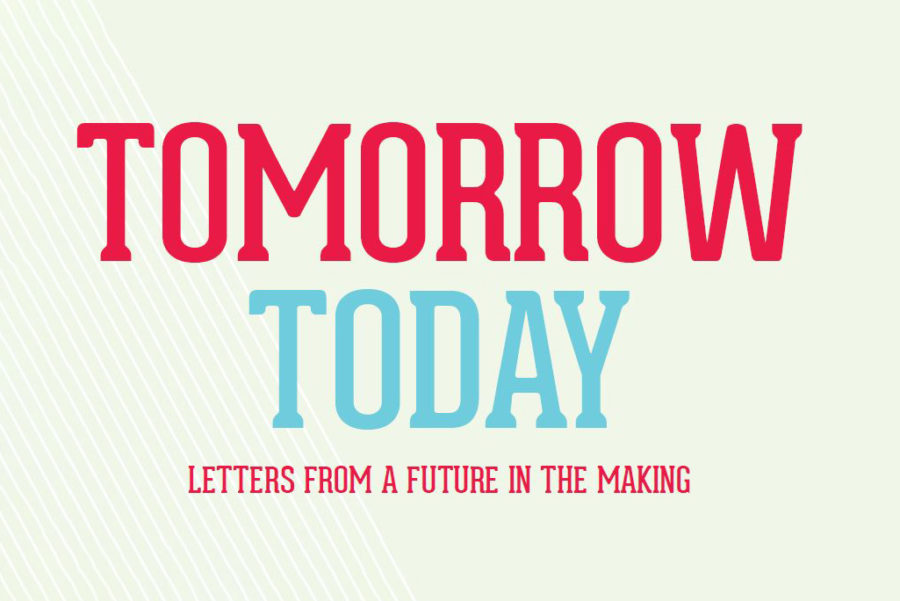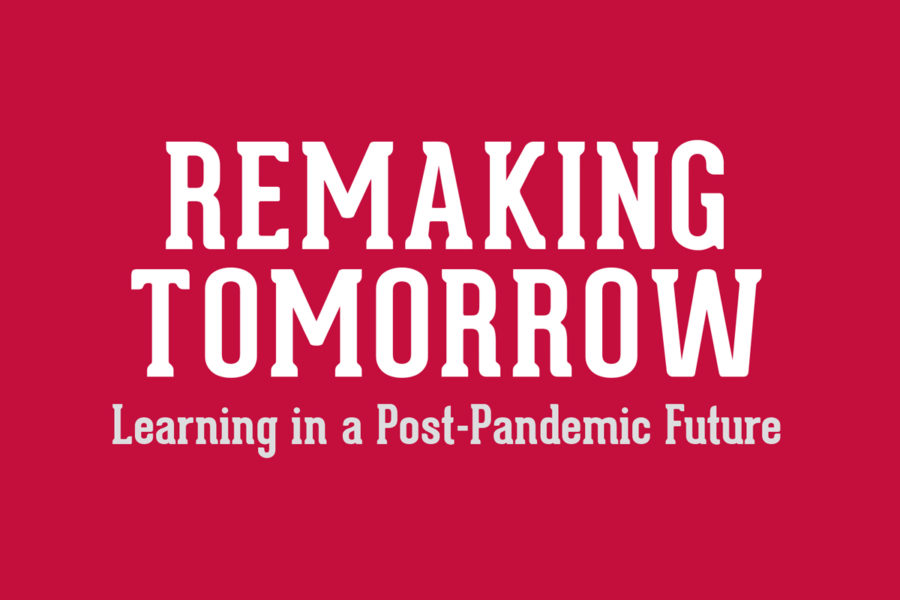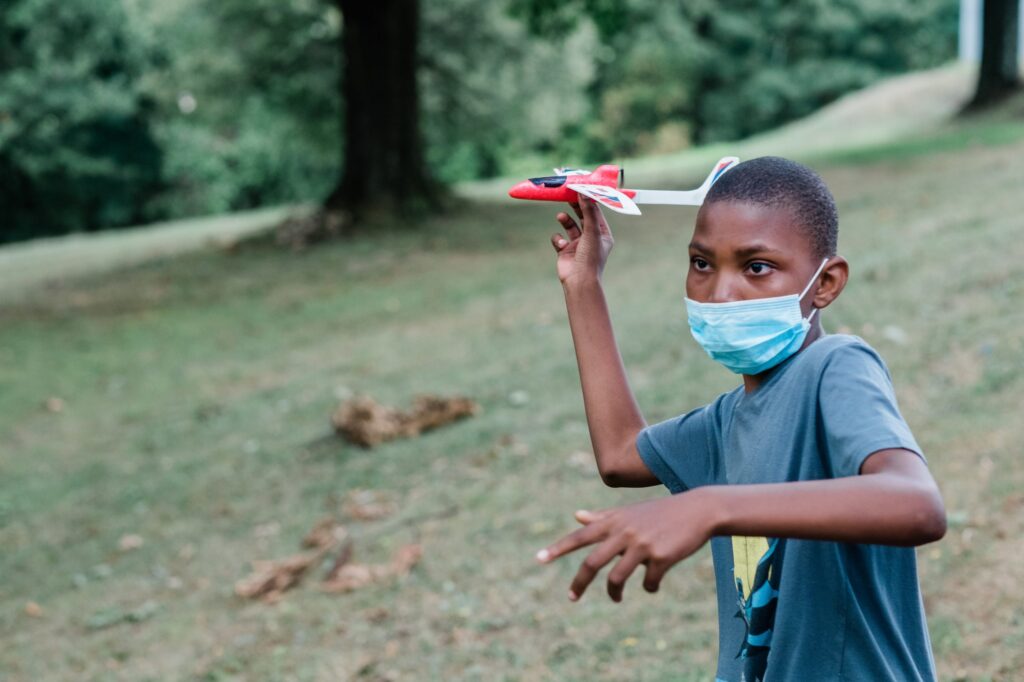For 13 years, Remake Learning has gathered, connected, and collaborated with educators and changemakers to ask: “How do we go from doing things better, to doing better things?” After years of experimentation, research, and hard work, we saw some of our best and brightest practices come to life over the last several months—real-time, peer-led professional development, truly personalized learning, and anywhere/anytime learning on the go. However, we also felt the depth and pain of inequity and the fragility of our education system, which undoubtedly impacts our most vulnerable learners and learning environments.
But together, we rallied across virtual spaces of all kinds. Educators gathered in droves for professional development led by intermediate units, the Arts Education Collaborative, and the Transform For Tomorrow team. Through the Tomorrow campaign, we kept our collective eyes on the horizon, while staying grounded in the timeless teachings of Fred Rogers.
We never stopped uplifting and celebrating in-school, out-of-school, at-home, and care workers. Under the banner of the Pittsburgh Learning Collaborative, we joined over 100 organizations to support family caregivers and community helpers. In addition, we recruited 40 practitioners to begin shifting power in education-research practice and we launched a lab to strengthen computer science literacy in- and out-of-school. Internally, we took stock, questioned, and examined how our work shows up in practice, communities, and our shared identity as educators.
In the coming months, we will share our vision for 2021, a year that promises to move through and beyond pandemics. For now, we offer a review of our last few months and invite you to ask questions, send us ideas, and help shape our network, together.
The Tomorrow Campaign
Tomorrow, powered by Remake Learning, is a campaign that explores what we can do today to make tomorrow a more promising place for all learners.
Building on a successful launch in late May, the Tomorrow campaign shifted into high gear over the summer months. From June through September, the campaign published 18 stories and hosted 17 live conversations, each exploring a different aspect of the future of learning—from assessments and education technology, to parent engagement, mentorship, and equity, among others. They also drew extensively on the challenges and changes precipitated by the COVID-19 pandemic. Conversations welcomed a range of expert guests and futurists, including:
- Lynne Schrum, professor of education
- Peter Bishop, founder and executive director of Teach the Future
- Local teens
- Richard Yonck, futurist, author, and consultant
- Kwaku Aning, director of the Center of Innovation and Entrepreneurial Thinking at the San Diego Jewish Academy
- Tyra Good, educator and innovator
- Timothy Jones, chief visionary officer of #HipHopEd
- Educators and students from the Global Minds Initiative
- Katherine Prince, senior director of strategic foresight for KnowledgeWorks
- Natalie Nixon, author and founder and director of Figure 8 Thinking
- Suzanne Walsh, president of Bennett College
- Cheryl Doig, leadership futurist at Think Beyond Ltd. and senior consultant at Leadership Lab NZ
- Gregg Behr, executive director of The Grable Foundation and founder and co-chair of Remake Learning
- Temple Lovelace, founder/director of equityXinnovation Lab
- Sana Jafri, executive director of the Chicago Learning Exchange
- Anne Olson, director of state advocacy for KnowledgeWorks
- James Brown, founder and director of creative youth development for The Lighthouse Project
- Tyree Allie, project participant and mentor for The Lighthouse Project
- Lasse Leponiemi, co-founder and executive director of HundrED
In August and September, the campaign hosted four pop-up professional learning networks in partnership with Allegheny Intermediate Unit’s transformED. These half-hour sessions featured conversations with teachers and school leaders and offered time for all to reflect upon innovative teaching approaches and practices that emerged during COVID-19 school closures. The campaign also helped support and promote the complimentary webinar series Transform For Tomorrow, which offered separate knowledge-building sessions for school leaders and families/caregivers.
On September 4, the campaign announced 17 Tomorrow Grants totaling nearly $1.43 million. The grants will fund groundbreaking, R&D-like projects over the next 12 months and are designed to help educators explore experimental ideas, test new concepts, and discover powerful ways to move the field toward the future of learning.
In July and September, the campaign released two reports: Remaking Tomorrow: Learning in a Post-Pandemic Future and Tomorrow Today: Letters from a Future in the Making. The former offers educators aspirations and action steps for shaping a just, equitable, and learner-centered future of learning, while the latter envisions variations of that future through a series of fictitious letters from the year 2035.


Network Activities
Activities are designed to cultivate and support a regional community of peer professionals committed to the vision and values of Remake Learning.
Network Events
Remake Learning Meetups and Lunch & Learns continued to convene virtually from June through September, beginning with the June 2 Researcher-Educator Meetup for 72 registrants.
In July, early childhood educators, advocates, and writers gathered for a meetup focused on reflection and the importance of play, pace, and early childhood. Later that month, an additional meetup featured a “train the trainer” opportunity for the ToyzSTEAM pilot program, a four-week project-based learning course that integrates elements of writing, storytelling, character creation, sound recording and production, packaging design, marketing, entrepreneurship, and game design.
In August, network members gathered twice; first, for the Work Reimagined: XPRIZE Rapid Reskilling and the Future of Work Meetup, and later, for the Equity in PA Fill-Up Lunch & Learn, which welcomed Nikole Hollins-Sims from the Pennsylvania Training and Technical Assistance Network. During her session, Nikole provided an overview of educational equity, methods for interrupting bias, and resources to help educators as they support students and families in navigating racial unrest.
Finally, in September, Remake Learning welcomed partners from PCTV to collaborate with and teach educators how to stream their content, programs, and resources through the station.
Rural Outreach
As with wider network meetups, rural members continued to convene virtually this summer. Convenings occurred in June, July, August, and September, covering a wide array of current events and topics in teaching and learning.
Members first met on June 3, welcoming staff from the Westmoreland Intermediate Unit to share tactics and strategies for engaging English language learners in rural communities. Rural math educators convened in July, led by National Math and Science Initiative senior program manager Muriel Alim and Get More Math! Founder Josh Britton. Their session focused on online learning strategies and related best practices and resources.
In August, educators turned their focus to issues of racial diversity, equity, and inclusion in rural schools. The first Race in Rural Spaces Meetup provided an open space for both formal and informal educators to dive deeper into related concepts and hold time for reflection. Moving forward, Remake Learning’s Rural Coordinator and committee will plan additional Race in Rural Spaces sessions.
Lastly, on September 22, local members and students from The National Center for Women & Information Technology and their Aspirations in Computing program joined rural network members for a meetup in support of increasing women and girls in STEM and computing.
Remake Learning Days Across America (RLDAA)
Following the postponement of RLDAA 2020, event organizers prioritized planning for the 2021 festival. They confirmed the festival’s national launch event for October 13, designed for regional leads, event hosts, and education stakeholders from across the country
To support the 2021 festival, the team also scheduled a webinar series for regional leads, event hosts, and caregivers. The webinars will coach regional stakeholders in planning and preparing for their 2021 events. Webinars are slated to begin in November 2020 and run through June 2021. Work is also underway to update the RLDAA website, including a refresh of the national homepage, about us page, and toolkit page, plus functionality updates to the event submission form and regional homepages.
Throughout the summer, RLDAA also helped coordinate and promote the Transform For Tomorrow: So Now What? series for parents and caregivers, and secured multiple international accolades, including HundrED’s Learning Across America Forerunners Spotlight.
Working Groups
Remake Learning Working Groups actively explore topics through events, communications, learning opportunities, mini-grants, and more.
CSforPGH
Over the summer, CSforPGH made strides in recruitment for its upcoming Learning Lab project. The lab, which is funded by the BNY Mellon Foundation and inspired by the successful Digital Corps and rec2tech models, will pair in-school computer science teachers with out-of-school (OST) educators to build stronger OST pathways for computer science learning. The working group confirmed five teachers and eight OST organizations for participation and held a project orientation on September 30.
The working group also scheduled a series of webinars for November-December, which will focus on inclusion and implementation, building on last year’s CSforInclusion event.
Maker Learning Collaborative
The Maker Learning Collaborative hosted several planning, networking, and professional learning convenings throughout the summer. First, on June 25, members gathered for a virtual happy hour and check-in. The following month, the group kicked off a series of learning opportunities with Five Free Digital Maker Tools for Maker Learning @ Home on July 23, followed by the Introduction to Challenge Based Learning: Authentic Design on July 28.
On August 25, the Maker Learning Collaborative’s steering committee met to continue refining the group’s vision, values, goals, and outputs.
STE(A)M Ecosystem
The Pittsburgh Regional STE(A)M Ecosystem remained busy this summer, working on several special projects and member convenings. The Working Group Lead attended weekly meetings with the Pennsylvania State Ecosystems Initiative and the STEM PUSH (Pathways for Underrepresented Students to HigherEd) Network. She also continued to work with the larger STEM PUSH team, as they assess the cultural competency of pre-college STEM programs in New York, San Francisco, Chicago, and Pittsburgh, working toward their ultimate goal of establishing a network of accredited, precollege programs and boosting STEM college enrollment for underrepresented students.
Ecosystem members also actively assisted in the planning of the STEM Learning Ecosystem’s Community of Practice Convening, slated for October. They collected presentation proposals from local members and met with a national advisory group to inform the upcoming conference and the longer-term sustainability of the group’s work.
Amongst major project work, the group also convened ecosystem members for a virtual happy hour on July 22 and hosted a Facebook livestream on July 9, which featured out-of-school summer program hosts and their various STEAM offerings.
Exploratory Groups & Projects
Remake Learning Exploratory Groups and Special Projects investigate emerging trends in teaching and learning and engage in collaborative work with community partners.
Shifting Power in Educational Research & Development (Shifting Power)
Shifting Power hosted a virtual information session for potential cohort applicants on June 23 and completed participant recruitment in August. They finalized a cohort of 20 educators and 20 researchers and welcomed all with a virtual meet and greet in September. In addition, they established a private Facebook group to facilitate ongoing cohort communication.
PL2
PL2 project management transitioned to the Remake Learning Field Director this summer. She held an onboarding meeting with the project’s product management, development, and research teams. Moving forward, Remake Learning will liaise with the project’s learning implementation partners, including Propel Schools, Ready to Learn, Homewood Children’s Village, Boys & Girls Clubs of Western Pennsylvania, and Elizabeth Forward and Shaler School Districts, to manage progress and facilitate communication.
Pittsburgh Learning Collaborative (PLC)
Remake Learning team members continued to engage with the PLC, which brings together leaders to brainstorm solutions to remote learning, technology access, and communication issues exacerbated by COVID-19, by attending all-collaborative meetings and subsequent work group meetings.
On August 18, the Chronicle of Philanthropy, in collaboration with the Independent Sector, published a feature on the PLC and Remake Learning.
Authored by: Ani Martinez, Producer for the Shifting Power project
